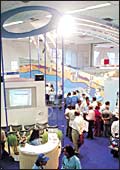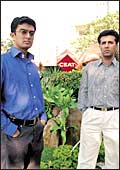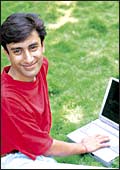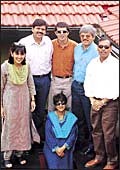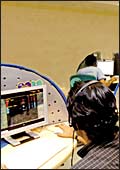|
|
|
|
|
|
|
|
|
|
|
|
| Boomtime vignettes: From
top and from left to right Boy-wonder Sabeer Bhatia; the man
who saw ahead in January 1996, Rediff.com's Ajit Balakrishnan;
the teeming crowds at India Internet World 1998; Jupiter's
netguru Gene de Rose; we'll-produce-butterflies VCs Raj Kondur
and Ashish Dhawan; jobsite entrepreneur Puneet Dalmia; the
Indya team in happier days; IIW 98 again; and Yahoo Shammi
Kapoor |
Do
you remember where you were and what you were doing on August
9, 1995? Not vague generalities such as "I think I was in
London" or "I must have been at work" but specific
locations and happenings? Ten years is a long time, but this writer
remembers where he was (at work, in a newspaper's HQ in Chennai)
all day and what he did in the evening: chatted briefly with a
friend who called to say The Grateful Dead's Jerry Garcia had
finally passed on-fare ye well, Jer-and then listened and re-listened
to Birdsong, a GD classic. August 9, 1995, was also the day the
Netscape IPO opened, and sold out, but here in India, the following
day's newspapers paid just about as much attention to it as they
did to Garcia's passing, which wasn't much.
In an article in Wired (print may pay my
bills, but it is so limited; had this been a blog, Constant Reader,
a link would have taken you straight to the piece) Kevin Kelly,
whose new designation at the magazine is Senior Maverick (if you
do not know the man go ahead and Google his name; and please excuse
the profusion of parentheses; they're the closest I can get to
links), writes that "The Netscape IPO wasn't really about
dot-commerce." "At its heart was a new cultural force
based on mass collaboration, blogs, Wikipedia, open source, peer-to-peer-behold
the power of the people."
In many ways, 1995 marked the beginning of
the internet age: Yahoo was incorporated in March of the year;
Amazon went live in July; Netscape's IPO debuted in August; and
in December, AltaVista launched its services with 16 million indexed
pages (something that immediately made it the web's largest search
engine in those days).
VSNL, then still state-owned, did launch
a 14.4 kbps dial-up internet access service that year, and early
users-in Mumbai, for some reason, it was actor Shammi Kapoor,
who was the only one, between Jonathan Swift and Jerry Yang and
David Filo, to be associated with the term Yahoo! (he had yelled
it out, repeatedly, in a motion picture he starred in back in
the 1960s or 1970s and it had caught on)-spoke at free seminars
to spread the message about the wondrous www, but the internet
age did not really dawn in India till December 1997.
That month, a Bangalore-boy named Sabeer Bhatia,
who had made the Valley his home, sold his free e-mail service
Hotmail to Microsoft for $400 million (Rs 1,760 crore). Bhatia
and this writer were batch mates for two years at one of India's
best-known engineering schools before the former transferred out,
but hey, 10 years on, I get to write about the internet age and
he gets to keep the remnants of $400 million, so I guess life
is fair.
If 1998's India Internet World, a jamboree
featuring venture capitalists, dotcom entrepreneurs, and awe-struck
bystanders who desperately wanted to be part of it all wasn't
the actual point of inflection, then it was a pretty good mirror
of what was happening. Bhatia was there, as were several other
worthies, including Gene de Rose, a striking looking man with
a goatee and a shaven pate, who had wanted to be a writer, actually
tended bar to keep body and soul together, and ended up heading
one of the world's most respected internet research firms (Jupiter).
The next three years were like an extended
Jay-Gatsby-style party (resort to Google and you'll find out how
Scott Fitzgerald was able to write so feelingly about boom and
bust).
| Things usually happen in India shortly
after they do in China, and the successful listing of Baidu.com
in the US and the acquisition of Chinese e-commerce firm Alibaba
by Yahoo, presage a better future for the net in India |
In Delhi, Ashish Dhawan and Raj Kondur, both
young veterans from us investment banks, founded a venture capital
firm Chrysalis and worked out of the city's Oberoi Hotel; the
two of them and entrepreneurs with dollar-dreams in their eyes
and portable computers in their hands became fixtures at the hotel's
coffee shop.
In Bangalore, spurned by Yahoo-wannabe Rediff
(he wanted to buy it out), Raj Koneru launched Indiainfo, another
Yahoo-wannabe.
And in Bombay, Rajesh Jain was building on
a family of content-rich sites that he would eventually sell to
Sify in November 1999 for a staggering Rs 500 crore. The magic
bus was rolling and everyone wanted to be on it.
Then, reality, in the form of low pc penetration,
even lower internet penetration, and the fact that being a dotcom
didn't excuse an enterprise from having a sound, revenue-based
business plan, struck back. Several thousand Indian dotcoms died
in 2001 and 2002.
By then, the net had changed everything.
Today, the benefits of the internet are so widespread that they
are often taken for granted. Most Indian companies boast digital
supply chains that enhance efficiency and reduce costs. The telecom
boom has been engendered, in part, by networks that are IP (internet
protocol) enabled. And the resurgence of interest in India as
a destination for venture capital and private equity funds can
be traced back to the glory years of the dotcom boom.
Circa August 2005, India has around 40 million
internet users , largely resident in urban areas. The personal
computer isn't really personal in India with most people being
able to access one only in cyber cafes or at work. And, at last
count, the country had less than half a million broadband connections
(up from less than a 10th of a million six months back; and broadband
itself is what consultants would like to term a game-changer as
far as the penetration and the use of the internet in India goes).
If there's reason for hope, it is that India
is expected to have 200 million mobile telephony subscribers by
2008, if not 2007. If there's reason for hope, it is that internet-on-cable
looks set to become a widely-available and cost-effective alternative
to every other form of internet access. And if there's reason
for hope, it is that things happen in India shortly after they
do in China, and the successful us-listing of Chinese search firm
Baidu and the acquisition of the country's e-marketplace Alibaba.com
by Yahoo presage a better future for the net in India.
Do you remember what you were doing on August
9, 2005? Well, this writer was listening to a podcast of a August
10, 1995, memorial service to Garcia, loaded on to his iPod by
a colleague, a podcast fiend, who seems to have enough time on
his hands for such things. Must google to find out what that French
saying is about how the more things change...
|






